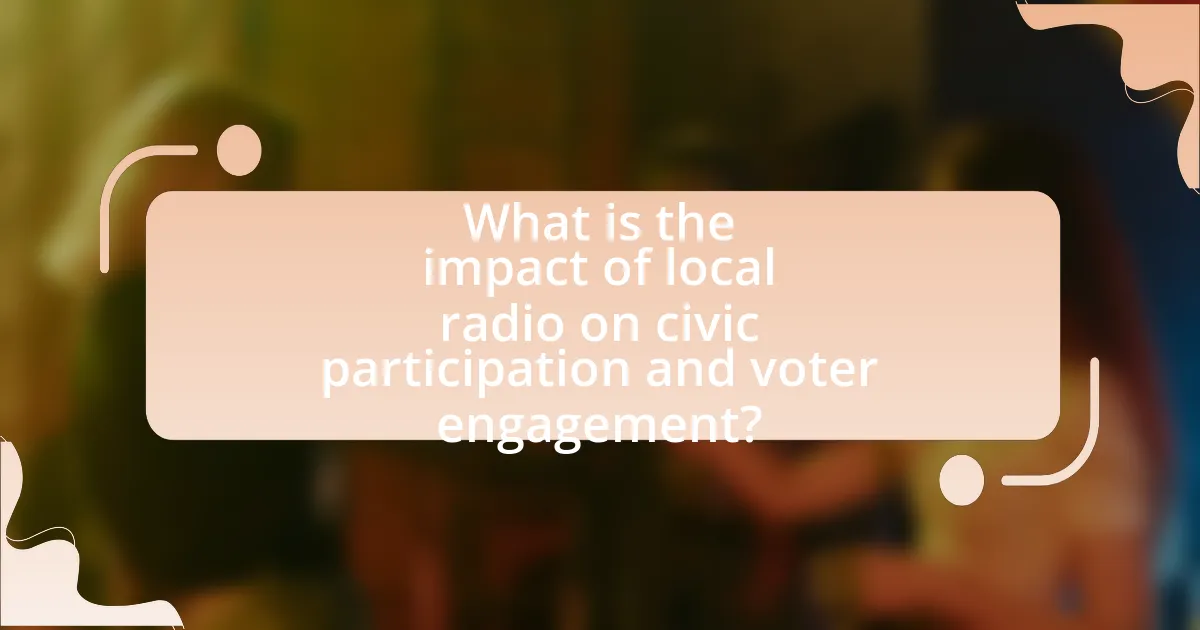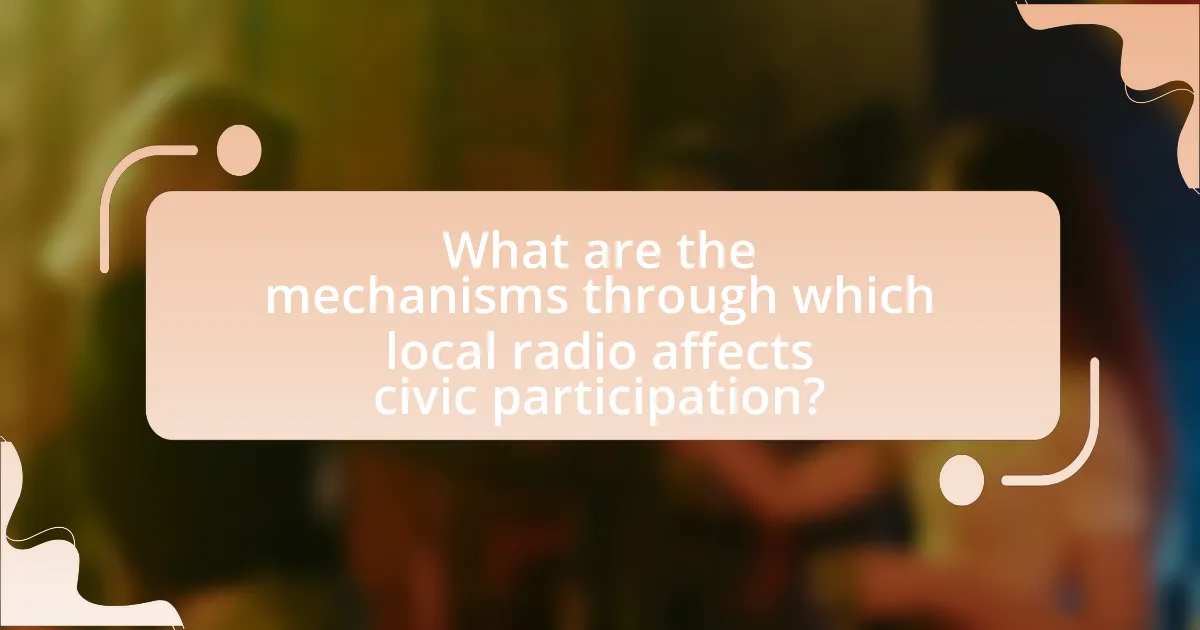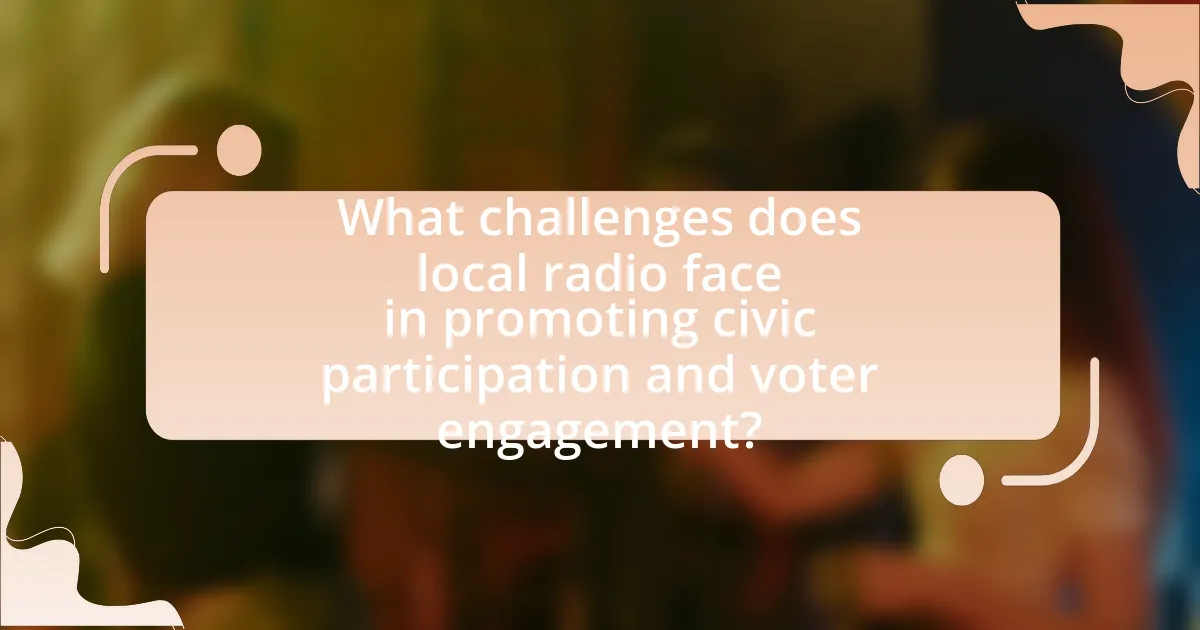Local radio serves as a vital platform for enhancing civic participation and voter engagement within communities. The article examines how local radio stations provide accessible information, foster community dialogue, and inform citizens about civic issues, leading to increased voter turnout and community involvement. It highlights the mechanisms through which local radio influences civic engagement, the importance of partnerships with civic organizations, and the challenges faced in reaching diverse audiences. Additionally, the article discusses best practices for local radio to improve outreach and engagement, emphasizing the role of tailored programming and interactive content in promoting civic responsibilities and participation in the electoral process.

What is the impact of local radio on civic participation and voter engagement?
Local radio significantly enhances civic participation and voter engagement by providing accessible information and fostering community dialogue. Research indicates that local radio stations often serve as platforms for discussing local issues, which encourages listeners to become more informed and involved in civic matters. For instance, a study by the Pew Research Center found that local news outlets, including radio, play a crucial role in informing citizens about elections and local governance, leading to higher voter turnout. Additionally, local radio often features interviews with community leaders and public officials, which can motivate listeners to participate in civic activities and engage in the electoral process.
How does local radio influence community involvement?
Local radio significantly influences community involvement by providing a platform for local issues, events, and discussions that engage residents. This medium fosters a sense of community identity and encourages participation in civic activities, as evidenced by studies showing that local radio stations often serve as a primary source of information about local governance, community events, and volunteer opportunities. For instance, research conducted by the Pew Research Center indicates that local radio listeners are more likely to participate in community events and civic activities compared to non-listeners, highlighting the role of local radio in enhancing civic engagement and fostering a more informed citizenry.
What role does local radio play in informing citizens about civic issues?
Local radio plays a crucial role in informing citizens about civic issues by providing timely and relevant information that directly affects their communities. It serves as a platform for local news, discussions, and interviews with civic leaders, which helps to raise awareness about important topics such as elections, public policies, and community events. According to a study by the Pew Research Center, 44% of Americans reported that local radio is their primary source of news about local government and civic matters, highlighting its significance in fostering informed citizenry. This accessibility and focus on local content empower listeners to engage more actively in civic participation and voter engagement.
How does local radio foster a sense of community among listeners?
Local radio fosters a sense of community among listeners by providing localized content that reflects the interests and concerns of the community. This medium often features local news, events, and discussions that resonate with the audience, creating a shared experience. For instance, studies have shown that local radio stations are more likely to cover community-specific issues, such as local elections and civic events, which encourages listener engagement and participation. Additionally, local radio often includes listener call-ins and community announcements, further enhancing the connection between the station and its audience. This interactive format not only informs listeners but also cultivates a feeling of belonging and collective identity within the community.
Why is local radio important for voter engagement?
Local radio is important for voter engagement because it provides accessible, localized information that directly influences community awareness and participation in elections. By broadcasting relevant news, candidate interviews, and discussions on local issues, local radio stations foster a sense of connection between voters and the electoral process. Research indicates that communities with active local radio stations experience higher voter turnout rates, as these platforms effectively mobilize listeners through targeted messaging and community involvement initiatives. For instance, a study by the Pew Research Center found that local media significantly impacts civic engagement, with 63% of respondents stating they are more likely to vote when informed by local news sources.
What specific voter information is disseminated through local radio?
Local radio disseminates specific voter information such as election dates, polling locations, candidate profiles, and voting procedures. This information is crucial for ensuring that voters are aware of when and where to vote, as well as the candidates and issues on the ballot. Studies have shown that local radio can significantly increase voter turnout by providing timely and accessible information, particularly in underserved communities where other forms of media may be less available.
How does local radio encourage voter turnout during elections?
Local radio encourages voter turnout during elections by providing accessible information about the voting process, candidates, and issues at stake. This medium reaches diverse audiences, particularly those in rural or underserved areas, ensuring that vital election-related information is disseminated effectively. Studies have shown that local radio stations often host discussions, interviews, and call-in segments that engage listeners and motivate them to participate in elections. For instance, a report by the Pew Research Center found that local radio can significantly influence civic engagement, with listeners more likely to vote when they receive tailored information relevant to their community.

What are the mechanisms through which local radio affects civic participation?
Local radio affects civic participation through mechanisms such as information dissemination, community engagement, and fostering local identity. By providing timely news and updates about local events, local radio stations enhance public awareness and encourage listeners to engage in civic activities. Research indicates that communities with active local radio stations experience higher levels of voter turnout and participation in local governance, as these stations often serve as platforms for public discourse and community dialogue. For instance, a study by the University of Southern California found that local radio significantly increases civic engagement by promoting local events and facilitating discussions on community issues, thereby reinforcing the connection between citizens and their local governance.
How does local radio create awareness of civic responsibilities?
Local radio creates awareness of civic responsibilities by providing timely information about community events, local governance, and civic duties. Through regular programming, local radio stations disseminate information on voter registration deadlines, upcoming elections, and public meetings, which encourages community members to participate actively in civic life. For instance, a study by the Pew Research Center found that local radio is a trusted source of information for many listeners, making it an effective medium for promoting civic engagement initiatives. Additionally, local radio often features interviews with civic leaders and discussions on relevant issues, further educating the public about their rights and responsibilities as citizens.
What types of programs are most effective in promoting civic engagement?
Programs that effectively promote civic engagement include community-based initiatives, educational workshops, and participatory media projects. Community-based initiatives, such as local forums and town hall meetings, foster direct interaction between citizens and local leaders, enhancing public discourse and involvement. Educational workshops that focus on civic rights and responsibilities empower individuals with knowledge, leading to increased participation in democratic processes. Participatory media projects, particularly those utilizing local radio, encourage citizens to share their voices and stories, thereby strengthening community ties and motivating civic action. Research indicates that local radio programs significantly enhance voter engagement by providing accessible information and creating a platform for community dialogue, as evidenced by studies conducted by the Pew Research Center.
How do listener demographics influence the effectiveness of these programs?
Listener demographics significantly influence the effectiveness of local radio programs aimed at civic participation and voter engagement. Different age groups, educational backgrounds, and socio-economic statuses affect how audiences perceive and respond to content, shaping their likelihood of engaging with civic issues. For instance, research indicates that younger listeners are more inclined to engage with digital platforms, while older demographics may prefer traditional radio formats, impacting the reach and effectiveness of voter engagement initiatives. Additionally, studies show that individuals with higher education levels are more likely to participate in civic activities when exposed to informative programming, highlighting the importance of tailoring content to specific demographic segments to maximize impact.
What partnerships exist between local radio stations and civic organizations?
Local radio stations often partner with civic organizations to enhance community engagement and promote civic participation. These partnerships typically involve collaborative initiatives such as voter registration drives, public service announcements, and community forums that address local issues. For example, the National Association of Broadcasters has highlighted various successful collaborations where radio stations have worked with organizations like the League of Women Voters to increase voter turnout, demonstrating the effectiveness of these alliances in mobilizing community action.
How do these partnerships enhance community outreach efforts?
Partnerships enhance community outreach efforts by leveraging local radio’s reach and credibility to disseminate information effectively. Local radio stations often collaborate with community organizations, which allows for tailored messaging that resonates with specific demographics. For instance, a study by the Pew Research Center found that local radio is trusted by 75% of listeners, making it an effective medium for engaging citizens in civic activities and voter participation. This trust facilitates greater community involvement, as residents are more likely to respond to outreach initiatives that come through a familiar and reliable source.
What are examples of successful collaborations in promoting civic participation?
Successful collaborations in promoting civic participation include initiatives like the “Civic Engagement Project” by the National Association of Secretaries of State, which partners with local radio stations to increase voter registration and turnout. This project has effectively utilized local radio’s reach to inform communities about voting processes, resulting in a measurable increase in voter participation rates. Additionally, the “Radio for Peace International” initiative collaborates with grassroots organizations to engage marginalized communities in civic discussions, fostering greater involvement in local governance. These collaborations demonstrate the effectiveness of leveraging local media to enhance civic engagement and participation.

What challenges does local radio face in promoting civic participation and voter engagement?
Local radio faces significant challenges in promoting civic participation and voter engagement, primarily due to limited resources and competition from digital media. Local radio stations often operate on tight budgets, which restricts their ability to produce high-quality content that effectively informs and engages the community. According to a 2020 report by the Pew Research Center, local radio listenership has declined as audiences increasingly turn to online platforms for news and information, making it difficult for radio to capture and maintain listener interest. Additionally, local radio may struggle with reaching diverse populations, as programming may not adequately reflect the interests and needs of all community members, further hindering its effectiveness in fostering civic engagement.
How do funding and resources impact local radio’s effectiveness?
Funding and resources significantly enhance local radio’s effectiveness by enabling better programming, technology, and outreach. Adequate funding allows local radio stations to invest in quality content, hire skilled personnel, and maintain up-to-date broadcasting equipment, which directly influences listener engagement and community relevance. For instance, a study by the Pew Research Center found that well-funded local stations are more likely to produce diverse programming that reflects community interests, thereby fostering civic participation and voter engagement. Additionally, resources facilitate partnerships with local organizations, amplifying the station’s reach and impact within the community.
What are the common funding sources for local radio stations?
Common funding sources for local radio stations include listener donations, sponsorships from local businesses, grants from government and nonprofit organizations, and advertising revenue. Listener donations often form a significant part of funding, especially for community radio stations, which rely on their audience’s support to operate. Sponsorships provide financial backing from local businesses seeking to promote their services, while grants can come from entities like the Corporation for Public Broadcasting, which supports public media initiatives. Advertising revenue, generated through commercial spots, remains a traditional and vital source of income for many local radio stations.
How does limited funding affect programming related to civic issues?
Limited funding significantly restricts programming related to civic issues by reducing the resources available for content creation, outreach, and community engagement. This financial constraint often leads to fewer programs that address critical civic topics, limiting public discourse and participation. For instance, a study by the Pew Research Center found that local radio stations with limited budgets often prioritize entertainment over informative civic programming, resulting in decreased voter engagement and awareness of local issues. Consequently, the lack of funding directly impacts the quality and quantity of civic-related content, hindering the ability of communities to engage effectively in democratic processes.
What barriers exist in reaching diverse audiences through local radio?
Barriers in reaching diverse audiences through local radio include language differences, cultural relevance, and limited access to technology. Language differences hinder communication with non-English speaking populations, making it difficult for local radio to engage these communities effectively. Cultural relevance is crucial; if programming does not reflect the interests and values of diverse groups, they are less likely to tune in. Additionally, limited access to technology, particularly in underserved areas, restricts the ability of certain demographics to access local radio broadcasts, further isolating them from civic participation and voter engagement opportunities.
How can local radio overcome challenges in audience engagement?
Local radio can overcome challenges in audience engagement by leveraging interactive platforms and community involvement. By utilizing social media and mobile apps, local radio stations can create real-time interactions with listeners, allowing for feedback and participation in programming. Research indicates that stations that actively engage with their audience through these channels see a 30% increase in listener loyalty and participation. Additionally, collaborating with local organizations and hosting community events fosters a sense of belonging and relevance, which can enhance audience connection and engagement.
What best practices can local radio adopt to enhance civic participation and voter engagement?
Local radio can enhance civic participation and voter engagement by implementing community-focused programming, facilitating public forums, and providing accurate information about the voting process. Community-focused programming, such as local news segments and interviews with civic leaders, fosters a sense of belonging and encourages listeners to engage with local issues. Facilitating public forums allows listeners to voice their opinions and discuss civic matters, creating a platform for dialogue. Providing accurate information about the voting process, including registration deadlines and polling locations, empowers listeners to participate in elections. Research indicates that local media can significantly influence voter turnout; for instance, a study by the Pew Research Center found that local news coverage can increase civic engagement by up to 20%.
How can local radio stations effectively utilize social media to engage listeners?
Local radio stations can effectively utilize social media to engage listeners by creating interactive content that encourages audience participation. This includes hosting live Q&A sessions, polls, and contests that invite listeners to share their opinions and experiences. For instance, a study by the Pew Research Center found that 64% of social media users engage with brands through interactive content, which highlights the potential for local radio stations to foster community involvement and dialogue. By consistently sharing relevant news, local events, and listener-generated content, radio stations can strengthen their connection with the audience, ultimately enhancing civic participation and voter engagement.
What strategies can be implemented to improve outreach to underrepresented communities?
To improve outreach to underrepresented communities, local radio stations can implement targeted programming that reflects the interests and needs of these groups. This includes creating content in multiple languages, featuring local leaders and influencers, and addressing specific community issues such as healthcare, education, and employment. Research indicates that when local media engages directly with marginalized populations, it enhances civic participation and voter engagement, as seen in studies by the Pew Research Center, which found that tailored communication increases trust and responsiveness among these communities. Additionally, partnerships with local organizations can amplify outreach efforts, ensuring that messages reach the intended audiences effectively.